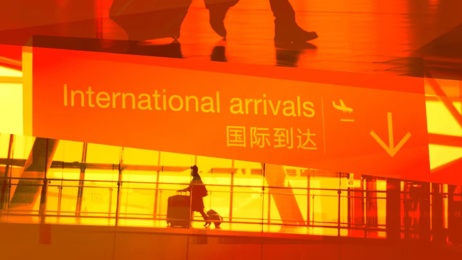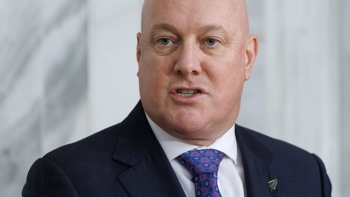Incoming Prime Minister Chris Hipkins has revealed he had a conversation with Jacinda Ardern late last year about the possibility she would be departing from the top job.
Hipkins, in his first round of media interviews as the new Labour leader and incumbent Prime Minister, revealed the conversation happened shortly before the Christmas break.
“I knew she was considering if she had enough in the tank,” he told the AM Show.
“I’ve had an opportunity of the summer to take a break and I wanted to do that because I also knew that if I was going to be taking on a bigger challenge then I wanted to make sure I was coming back reenergised and refreshed.
“I wanted to make the most of that opportunity because I don’t know that there’ll be much more opportunity for that in the next nine months.”
Hipkins yesterday was unanimously voted in as leader of the Labour Party and the next Prime Minister, to be sworn in on Wednesday following Jacinda Ardern’s formal resignation.
Carmel Sepuloni became the first Pasifika person to be chosen as the incoming Deputy Prime Minister, replacing Grant Roberston who will retain the finance portfolio. Kelvin Davis will stay on as the Labour Party’s deputy leader.
Speaking to TVNZ’s Breakfast, he pointed out that New Zealand was in a very different position this time last year - still dealing with Covid restrictions, cases and the international border still closed.
“A lot has happened in a year and so there is a need for us, as a Government, to refocus and to make sure that we’re really focused on those bread and butter issues that New Zealanders are focused on at the moment.”
For many Kiwis, that was about their grocery, electricity bills and mortgage rates, Hipkins said.
- Chris Hipkins: Running the ruler over the Government's work programme
- Roman Travers: Will Chris Hipkins save the Labour Party?
- Christopher Luxon: A change of leadership won't change the Government's shortcomings
”They want to know that the Government’s got their back.”
Hipkins told RNZ his new Government would be looking closely at the new policies it wanted to implement.
“A lot has changed in the last year, so we do need to run the ruler over the Government’s work program.”
When asked if this was an acknowledgement that the Government had moved too far, too fast on social issues, Hipkins said he thought his team needed to communicate better.
That was particularly the case with Three Waters policies and co-governance.
“Sometimes we haven’t necessarily explained enough what we’re doing,” he said.
“Some of the concerns about what we’ve done that I’ve heard from New Zealanders is from a position of fear. So we might need to slow down and better explain what we’re working on.
“When it comes to Three Waters we have a massive challenge in New Zealand.
“We’ve got between $130 to $180 billion worth of investment required in our water assets over the next 30 years or so.
“Some of the rates increases people could see without further reform in this area could be substantial.”
When asked if the Government would cut spending, Hipkins said the cost of living and inflation will be central considerations.
Hipkins also said he would be listening to the business community and its desire that immigration be opened up to allow for more skilled migrants to come in.
However, he said it was important to balance that against providing ways for local Kiwis to boost their skills and meet the skill shortages.
When asked if he would be a Prime Minister that made captain’s calls, Hipkins said he didn’t want to surprise people.
“I want to be a Prime Minister that is upfront with New Zealanders, one that doesn’t surprise people hugely, one that focuses on the issues New Zealanders want us to.”
Hipkins said there were some things that we did, however, need to accept - including inflation. It was something that was affecting the world, he said.
Ahead of the October election, Hipkins told Newstalk ZB that the Government will be focused on getting Kiwi’s through ‘tough economic times’.
“Nine months is a challenge, but we can do a lot in nine months and we will,” he said.
“We’re doing everything we can to contribute to getting the inflationary situation under control and we’re supporting them through what is going to be a choppy six months or so, they want to know that we are supporting them through that.”
Speaking at his first full press conference as party leader, much of Hipkins’ comments concerned the economic pain being felt by Kiwis and his desire to pare back non-essential programmes.
“[I] know that many people in New Zealand, many families are struggling at the moment,” he said.
“I know that some New Zealanders feel that we are doing too much, too fast, and I have heard that message.
“Over the coming week, Cabinet will be making decisions on reining in some programmes and projects that aren’t essential right now.
“The current global economic conditions do demand a refocus and I intend to provide that, but we don’t need a change of heart.”
While he wouldn’t detail what particular policies would be set aside, Hipkins said he wanted to strengthen core public services like health and education, alongside a promise to improve people’s access to housing.
“You shouldn’t have to be on a six-figure salary to afford to buy a house to support your children and to have enough to retire on.”
/cloudfront-ap-southeast-2.images.arcpublishing.com/nzme/3DOZ4RQPLJGVPGC7GZMDIFAAXU.jpg) Incoming Prime Minister Chris Hipkins was frank about the importance of the economy in the year ahead. Photo / Mark Mitchell
Incoming Prime Minister Chris Hipkins was frank about the importance of the economy in the year ahead. Photo / Mark Mitchell
He addressed the controversial topic of co-governance, now synonymous with the Government’s Three Waters legislation.
Hipkins stressed that “no one understands what [co-governance] means because we’re talking about quite different things”, but admitted it “hasn’t always been clear” what the Government has meant when it talked about co-governance proposals in the past, and he offered to be clearer in the future.
“There is an uncertainty in New Zealanders about what we mean when we are talking about co-governance. I want to make sure that in each context we are very clear about what we mean and I acknowledge that that hasn’t always been clear,” he said.
The Government has instituted co-governance at the top of the new Three Waters entities, with the four new water entities responsible to co-governed boards.
The Government has also put an element of co-governance into the health reforms, creating a devolved Māori Health authority, which is responsible for elements of Māori health but also has a responsibility to co-design health plans for the wider population.
Hipkins noted that under National, many treaty settlements included co-governance provisions for places like the Whanganui River and Te Urewera.
“The National Government probably signed up to more co-governance arrangements through the Treaty process than any other government did. It means a different thing in a different context,” he said.
Hipkins would discuss a Cabinet reshuffle with MPs this week with a public announcement expected next week.
The soon-to-be Prime Minister said he aimed to strike a balance between drawing on experienced MPs while utilising talent from Labour’s large pool of MPs who entered Parliament in 2020.
/cloudfront-ap-southeast-2.images.arcpublishing.com/nzme/RXXATUCDUREN5CZYDPG23GIG5A.jpg) Incoming Prime Minister Chris Hipkins said he had always wanted Carmel Sepuloni as his deputy. Photo / Mark Mitchell
Incoming Prime Minister Chris Hipkins said he had always wanted Carmel Sepuloni as his deputy. Photo / Mark Mitchell
Hipkins also used the press conference to explain his recent separation from his wife and his plea to New Zealanders to respect her privacy and that of his two children.
“A year ago, my wife and I made the decision that we would live separately, that we would do everything we can to raise our children together.
“We remain incredibly close, she’s still my best friend, but we have made that decision in the best interest of our family.
“I want [my children] to grow up with a typical, Kiwi-kid life. I want them to be able to make mistakes, I want them to be able to learn and to grow without five million people looking over their shoulder, so I intend to keep them out of the public limelight.”
On his deputy, Hipkins described Sepuloni as a “good friend” who he “trusted completely”.
“As a proud westie, I can’t think of a better sidekick for a Prime Minister from the Hutt,” he said.
Sepuloni and Hipkins entered Parliament together in 2008 and their collegial relationship was on display.
“It is very hard to fathom that a working-class girl from Waitara who turned westie [West Auckland] ... can become the Deputy Prime Minister of New Zealand and now I get to back up the boy from the Hutt,” Sepuloni said.
Sepuloni referenced her Sāmoan, Tongan and New Zealand European heritage in outlining the significance of her appointment, as well as the message it sent to women and girls about their chances of attaining leadership roles.
Both paid homage to Ardern and her legacy, with Hipkins considering her to be one of New Zealand’s great Prime Ministers.
“New Zealand is in a much better position compared to most countries, economically and socially, because of Jacinda’s leadership and the critical decisions that she made.”
Ardern’s last formal duty in the role will be the annual visit to Rātana on Tuesday.
Take your Radio, Podcasts and Music with you









